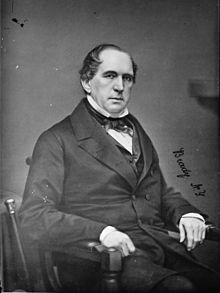
Back إراستوس كورنينغ Arabic اراستوس كورنينج ARZ اراستوس کورنینق AZB Erastus Corning (Politiker, 1794) German Erastus Corning I Italian
Erastus Corning | |
|---|---|
 Portrait of Erastus Corning by Mathew Brady, c. 1860 | |
| Member of the U.S. House of Representatives from New York's 14th district | |
| In office March 4, 1861 – October 5, 1863 | |
| Preceded by | John H. Reynolds |
| Succeeded by | John V. L. Pruyn |
| In office March 4, 1857 – March 3, 1859 | |
| Preceded by | Samuel Dickson |
| Succeeded by | John H. Reynolds |
| Member of the New York Senate from the 3rd district | |
| In office 1842–1845 | |
| Preceded by | Friend Humphrey |
| Succeeded by | William H. Van Schoonhoven |
| Mayor of Albany, New York | |
| In office 1834–1837 | |
| Preceded by | Francis Bloodgood |
| Succeeded by | Teunis Van Vechten |
| Personal details | |
| Born | December 14, 1794 Norwich, Connecticut, US |
| Died | April 9, 1872 (aged 77) Albany, New York, US |
| Resting place | Albany Rural Cemetery Menands, New York |
| Political party | Democratic |
| Spouse |
Harriet Weld (m. 1819) |
| Relations | Edwin Corning (grandson) Parker Corning (grandson) Erastus Corning 2nd (great-grandson) Edwin Corning Jr. (great-grandson) |
| Children | 5 |
| Profession |
|
Erastus Corning (December 14, 1794 – April 9, 1872) was an American businessman and politician from Albany, New York. A Democrat, he was most notable for his service as mayor of Albany from 1834 to 1837, in the New York State Senate from 1842 to 1845, and in the United States House of Representatives from 1857 to 1859, and from 1861 to 1863.
A native of Norwich, Connecticut, Corning moved to Troy, New York, when he was 13 so he could be trained for a career as a merchant. He worked as a clerk in his uncle's hardware store for six years, then moved to Albany, New York, to work for the retail business owned by James Spencer. Corning eventually became the senior partner in the enterprise, which he combined with businesses he inherited from his uncle to create Erastus Corning & Co. The Corning company sold ironware, including tools and farm implements, nails, stoves, parts for railroad cars, and rails for railroads. John V. L. Pruyn married Corning's niece Harriet, and Pruyn and Corning became partners in a variety of business ventures and investments. Under Corning's leadership, several local and regional railways were combined in the early 1850s to form the New York Central Railroad, and Corning served as its first president.
Corning was involved in politics as a Democrat, and served as Albany's mayor from 1834 to 1837. He was a member of the state senate from 1842 to 1845. In 1856 he was elected to Congress, and he served one term, 1857 to 1859. In 1860, he was again elected to the U.S. House, and he served a partial term, March 1861 to October 1863. Corning was a delegate to the 1860 Democratic National Convention and to the Peace Conference of 1861, which attempted to prevent the American Civil War. Though he was a Democrat and President Abraham Lincoln was a Republican, once the war started, Corning supported the Union while also criticizing what he viewed as the Lincoln administration's excesses.
After leaving Congress, Corning began to wind down his business and political activities. He left the presidency of the New York Central in 1865, and focused much of his attention on speculating in and developing land he had purchased in the western states. He served as a delegate to the 1867 state constitutional convention. In his later years, Corning speculated in and developed land in the western states. He died in Albany on April 8, 1872, and was buried at Albany Rural Cemetery.
© MMXXIII Rich X Search. We shall prevail. All rights reserved. Rich X Search